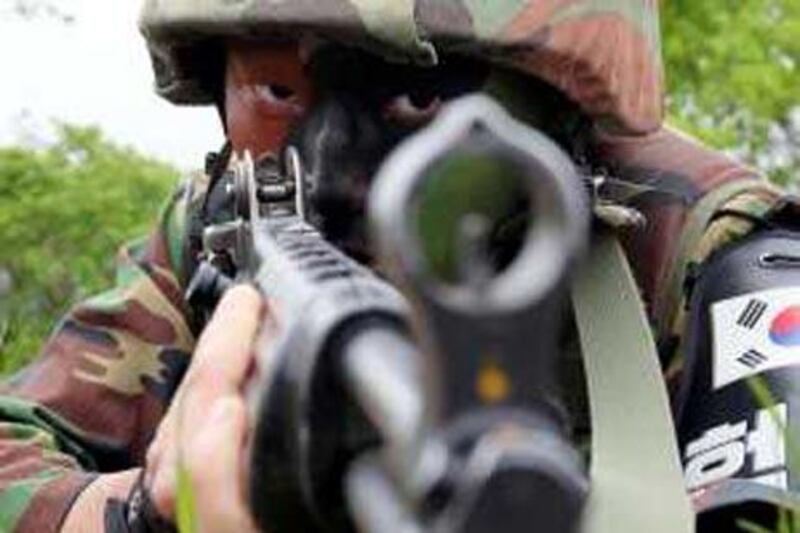BEIJING // South Korea yesterday announced a raft of financial sanctions against its northern neighbour for torpedoing a navy ship in March, including severing economic exchanges with the Pyongyang worth US$300 million (Dh1.1 billion). What was not officially announced, but was leaked by government officials to the media, is Seoul's plan to target the personal bank accounts of the North Korean leader Kim Jong Il.
On Monday, Lee Myung-bak, the South Korean president, said he would sever nearly all trade with North Korea and deny its commercial ships use of shipping lanes in South Korean waters. He also said South Korea would freeze all of its remaining exchanges with the communist North, except for a joint industrial park. It would also embark on anti-North military drills to enhance combat readiness, and restart anti-North Korea loud speaker broadcasts across the Demilitarized Zone dividing the Koreas, which have been suspended for the past six years.
In response, the North threatened to shoot at the huge loud speakers, which are mounted on the side of a mountain. The South's defence minister, Kim Tae-young, warned that the North's provocation would incur a military retaliation from the South. "Today's measures, together with previous sanctions will turn out to be very effective as they prevent the influx of capital and industrial technology from entering North Korea," said Cho Myung-chul, a former professor at the North's elite Kim Il-sung University in Pyongyang, who defected and now works at the South's state-run Korea Institute for International Economic Policy in Seoul.
South Korea yesterday also formally announced that it would refer the issue to the UN Security Council, but this would be a lengthy process and would likely face resistance from China, a veto-wielding member of the council and ally of the North. Beijing has not yet endorsed the international investigation that blamed Pyongyang for the attack, according to analysts. "Chinese investigators were also not part of the multinational investigation team that looked into the case. It was a conclusion largely spearheaded by the US and South Korea," said Jiang Longfan, a North Korea expert at Yanbian University, located near the north-east Chinese border with the North.
Expecting hurdles from China to further tightening UN sanctions, South Korea wants to mete out immediate measures against North Korea that especially focus on the financial accounts that channel money to Mr Kim. Anonymous South Korean officials told media outlets that the impact of such a move will be as painful as a military retaliation to the North's leadership. "This method will render extreme and real pain to North Korean leadership without having to go through the UN Security Council," an unnamed official told the South's official Yonhap news agency over the weekend.
Analysts agree with this assessment. "North Korea dreads it," said Dong yong-sueng, head of the North Korean economic security team at the Samsung Economic Research Institute in Seoul. "It's both very painful and inconvenient to North Korea. It's like you cannot use your banking card any more," Mr Dong said. Information on Mr Kim's personal financial accounts first surfaced in 2005. The US government at the time was cracking down on the use of the international financial system by what it considered "rogue states" and "state sponsors of terrorism". As a result of these investigations, a Macao-based bank, Banco Delta Asia, was blacklisted.
North Korea used the bank as a major gateway for worldwide money laundering. But investigators only later found out that the North Korean accounts in the bank had another very important role in supplying personal funds to Mr Kim and his family. The North's accounts at Banco Delta only contained $24m, a relatively minuscule sum even for the impoverished North. But Pyongyang reacted to the crackdown by boycotting six-party nuclear talks. The North's hypersensitivity aroused the curiosity of South Korean and US authorities and found out it was because the bank had managed Mr Kim's personal funds.
"The jittery response was not about 24 million ? It's because they touched chairman Kim's personal cashbox," said Lee Woo-tak, in his 2009 book , Survival Game between Obama and Kim Jong Il. Lee, a South Korean journalist who covered all of the Beijing-hosted six-party nuclear talks, said the freezing of Mr Kim's personal account was "much more effective than any other financial measure that the US had been pursuing before".
Last week, the US also hinted at taking similar actions. The US state department spokesman Philip Crowley on Thursday told reporters: "We have the authority to take unilateral actions in the financial sector and other areas ? we will look at how we can send a clear signal to North Korea." Exact figures on Mr Kim's personal assets are unknown, but the US treasury department previously estimated that the total amount of money North Korea siphons into the personal accounts of senior officials through international financial network by producing counterfeit US currency and drug trafficking to be around $500m annually.
sleethenational@gmail.com





